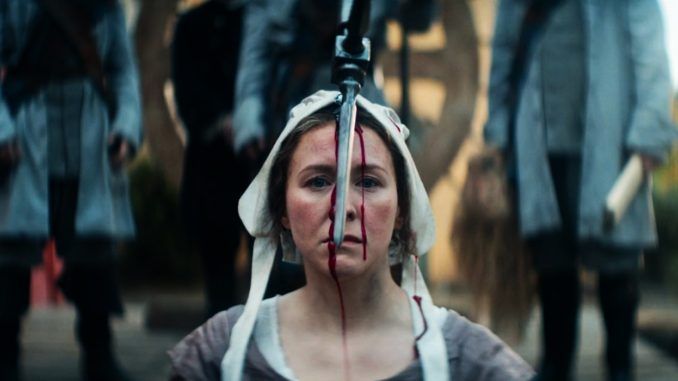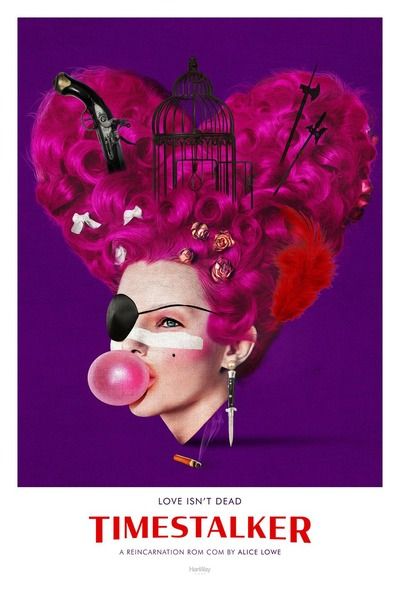
Rating: C
Dir: Alice Lowe
Star: Alice Lowe, Aneurin Barnard, Nick Frost, Tanya Reynolds
The moderate grade above is not really an accurate reflection of my reaction to this, which was all over the place. Some elements and moments were great; others were almost cringe-inducing. And it would flip from one extreme to the other in a moment. Quite the roller-coaster ride of emotions. I got a sinking feeling on seeing Lowe’s name, because I was singularly unimpressed with Prevenge. This has some of the same tendency towards smug self-indulgence. However, it has more ambition, and if falling short in some aspects, there’s a willingness to go big I have to respect. A gory love story spanning half a millennium (or possibly more), isn’t something you see every day.
Agnes (Lowe) loves Alex (Barnard), but it’s a literally doomed romance, because in every era the two souls meet each other, Alex is fated to die a bloody death before anything can come of it. For example, in 17th century Scotland, she trips and falls face-first onto a carelessly set-down polearm (top). As well as Alex, Agnes keeps running into other characters, again and again: George (Frost) is the nemesis, fated to try and keep the couple apart. Meg (Reynolds) is the bestie wing-woman, with an unrequited crush of her own, though that angle never goes anywhere and could have been dumped. It acknowledges, most obviously in the title, that Agnes’s behaviour is more than a little obsessive. However, mentally ill might be equally accurate.
 And that’s a problem. I ended up feeling greater pity than empathy for Agnes, as she erotomanias here way through the centuries, while Alex largely remains oblivious. The heroine is arguably one sledgehammer away from becoming Annie Wilkes, and that’s a risky line to tread. The film is on firmer ground when pointing out, and poking fun, at the various eras in which this takes place. [Although would it be churlish to point out that Propaganda song Duel, heavily used on the soundtrack for this section, wasn’t released until 1985? It is highly apt, I grant you] For example, in 1980, Alex is a pop star, and Agnes’s relief on discovering it was John Lennon who has been murdered, is deliciously black comedy.
And that’s a problem. I ended up feeling greater pity than empathy for Agnes, as she erotomanias here way through the centuries, while Alex largely remains oblivious. The heroine is arguably one sledgehammer away from becoming Annie Wilkes, and that’s a risky line to tread. The film is on firmer ground when pointing out, and poking fun, at the various eras in which this takes place. [Although would it be churlish to point out that Propaganda song Duel, heavily used on the soundtrack for this section, wasn’t released until 1985? It is highly apt, I grant you] For example, in 1980, Alex is a pop star, and Agnes’s relief on discovering it was John Lennon who has been murdered, is deliciously black comedy.
The same goes for a running joke about everyone believing they are the reincarnation of Cleopatra. Although the ending is another area which could have used work; it falls into a “Wait, what?” chasm of suddenness. I guess it’s a positive I was left wanting more, and you definitely cannot complain about a shortage of imagination. There are glimpses of other eras, from prehistoric through Victorian to the forties. However, these amount to so little, it feels like there’s a three-hour director’s cut sitting on Lowe’s hard-drive. I’m on the fence as to whether or not this would be a good thing. There has clearly been a significant amount of effort put into this. I’ll let you know whether it was worthwhile, just as soon as the whiplash wears off.
The film is available on demand now.
